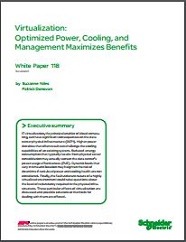Virtualization and Cloud Computing: Optimized Power, Cooling, and Management Maximizes Benefits

IT virtualization, the engine behind cloud computing, can have significant consequences on the data center physical infrastructure (DCPI). Higher power densities that often result can challenge the cooling capabilities of an existing system. Reduced overall energy consumption that typically results from physical server consolidation may actually worsen the data center’s power usage effectiveness (PUE). Dynamic loads that vary in time and location may heighten the risk of downtime if rack-level power and cooling health are not understood and considered. Finally, the fault-tolerant nature of a highly virtualized environment could raise questions about the level of redundancy required in the physical infrastructure. These particular effects of virtualization are discussed and possible solutions or methods for dealing with them are offered.


